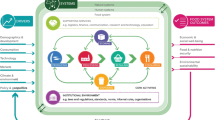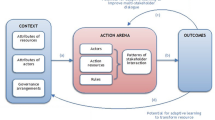Abstract
There has been growing interest in the use of urban agriculture to address food insecurity and poverty in Cape Town. This reflects debates on urban agriculture in the global south. In the north, growing food in cities has been tended to be framed in terms of its social benefits. This paper investigates the perceived benefits of urban agriculture in projects in Seawinds and Vrygrond in Cape Town. Using the concept of metabolic rift is argues for connections between northern and southern constructions of urban agriculture. This approach enables connections to be seen between the practice in seemingly different areas without losing the local context. The paper argues that by using this integrated approach, projects may be more sustainable and ultimately provide both clearer social and economic benefits.


Similar content being viewed by others
References
Allen, P. (1999). Reweaving the food security safety net: mediating entitlement and entrepreneurship. Agriculture and Human Values, 16(2), 117–129.
Armstrong, A. (2000). A survey of community gardens in upstate New York: implications for health promotion and community development. Health & Place, 6(4), 319–327.
Baker, L. E. (2004). Tending cultivated landscapes and food citizenship in Toronto’s community gardens. Geographical Review, 94(3), 305–325.
Battersby, J. (2013). The state of food insecurity in Cape Town, Urban Food Security Series, African Food Security Urban Network. Kingston, ON: Queen’s University (in press).
Bowyer-Bower, T. (1997). Conflicts for resolution and suggestions for consensus: legalizing urban agriculture in Zimbabwe. Geographical Journal of Zimbabwe, 28, 53–58.
Bryld, E. (2003). Potentials, problems and policy implications for urban agriculture in developing countries. Agriculture and Human Values, 20(1), 79–86.
Charlton, S., & Kihato, C. (2006). Reaching the poor? An analysis of the influences on the evolution of South Africa’s housing policy. In U. Pillay, R. Tomlinson, & J. Du Toit (Eds.), Democracy and delivery: urban policy in South Africa (pp. 252–282). Pretoria: HRSC Press.
City of Cape Town. (2007). Urban agriculture policy for the city of Cape Town. Cape Town: City of Cape Town.
City of Cape Town (no date) City of Cape Town Statistics http://www.capetown.gov.za/en/stats/Documents/City%20Statistics%202009.htm. Accessed 06 April 2011
De Silvey, C. (2003). Cultivated histories in a Scottish allotment garden. Cultural Geography, 10, 442–468.
De Zeeuw, H., van Veenhuizen, R., & Dubbeling, M. (2011). The role of urban agriculture in buidling resilient cities in developing countries. Journal of Agricultural Science, 149, 153–163.
Dikeç, M. (2001). Justice and the spatial imagination. Environment and Planning A, 33(10), 1785–1805.
Dirlik, A., & Prazniak, R. (2001). Introduction: cultural identity and the politics of place. In R. Prazniak, & A Dirlik (Eds.), Places and politics in an age of globalization (pp. 3–13). Lanham, Md: Rowman and Littlefield
Drakakis-Smith, D., Bowyer-Bower, T., & Tevera, D. (1995). Urban poverty and urban agriculture: an overview of the linkages in Harare. Habitat International, 19(2), 183–193.
Dunn, S. (2010) Urban agriculture in Cape Town: An investigation into the history and impact of small-scale urban agriculture in the Cape Flats townships with a special focus on the social benefits of urban farming. Unpublished MA Thesis, Department of Historical Studies, University of Cape Town
Ellis, F., & Sumberg, J. (1998). Food production, urban areas and policy responses. World Development, 26(2), 213–225.
Foeken, D. (2006). To subsidize my income: urban farming in an east African town. Brill: Leiden and Boston.
Glover, T. D. (2004). Social capital in the lived experiences of community gardeners. Leisure Sciences, 26, 143–162.
Gruenewald, D. A. (2003). Foundations of place: a multidisciplinary framework for place-conscious education. American Educational Research Journal, 40(3), 619–665.
Hall, D. (1996) Community gardens as an urban planning issue. Unpublished Master’s Thesis, Department of Community and Regional Planning, University of British Columbia
Holland, L. (2004). Diversity and connections in community gardens: a contribution to local sustainability. Local Environment, 9(3), 285–305.
Howard, E. (1965) [1898] Garden cities of to-morrow. MIT Press, Cambridge
Hovorka, A. (2008). Transspecies urban theory: chickens in an African city. Cultural Geographies, 15, 95–117.
Huchzermeyer, M. (2001). Housing for the poor? Negotiated housing policy in South Africa. Habitat International, 25, 303–331.
Jacobs, J. (1961). The death and life of great American cities. New York: Random House.
Jamison, M. A. (1985). The joys of gardening: collectivist and bureaucratic cultures in conflict. The Sociological Quarterly, 26(4), 473–490.
Jensen, S. & Turner, S. (1996) A Place Called Heideveld. Research Report No. 112, Department of Geography and International Development Studies, Roskilde University, Denmark
Kaplan, R. (1973). Some psychological benefits of gardening. Environment and Behaviour, 5(2), 145–162.
Krasny, M. E., & Tidball, K. G. (2009). Community gardens as contexts for science, stewardship, and civic action learning. Cities and the Environment, 2(1), 1–18.
Maxwell, D. (1995). Alternative food security strategy: a household analysis of urban agriculture in Kampala. World Development, 23(1), 1669–1681.
Maxwell, D., & Zziwa, S. (1992). Urban agriculture in Africa: the case of Kampala. Nairobi: ACTS Press.
Maxwell, D., Levin, C., & Csete, J. (1998). Does urban agriculture help prevent malnutrition? Evidence from Kampala. Food Policy, 23(5), 411–424.
May, J., & Rogerson, C. (1995). Poverty and sustainable cities in South Africa: the role of urban cultivation. Habitat International, 19(2), 165–181.
Mbiba, B. (1994). Institutional responses to uncontrolled urban cultivation in Harare: prohibitive or accommodative? Environment and Urbanization, 6(1), 188–202.
McClintock, N. (2010). Why farm the city? Theorizing urban agriculture through a lens of metabolic rift. Cambridge Journal of Regions, Economy and Society, 3, 191–207.
Miller, C. (2003). In the sweat of our brow: citizenship in American domestic practice during WWII—victory gardens. Journal of American Culture, 26(3), 395–409.
Mkwambisi, D. D., Fraser, E. D. G., & Dougill, A. J. (2010). Urban agriculture and poverty reduction: evaluating how food production in cities contributes to food security, employment and income in Malawi. Journal of International Development. doi:10.1002/jid.1657.
Møller, V. (2005). Attitudes to food gardening from a generational perspective: a South African case study. Journal of Intergenerational Relationships, 3(2), 63–80.
Mougeot, L. (2006). Growing better cities: urban agriculture for sustainable development. Ottawa: IDRC.
Pudup, M. B. (2008). It takes a garden: cultivating citizen-subjects in organized garden projects. Geoforum, 39, 1228–1240.
Rogerson, C. (1993). Urban agriculture in South Africa: scope, issue and potential. GeoJournal, 30(1), 21–28.
Ross, F. (2009). Raw Life, Decency, Housing and Everyday Life. Cape Town: UCT Press.
Saldivar-Tanaka, L., & Krasny, M. E. (2004). Cultivating community development, neighbourhood open space and civic agriculture: the case of Latino community gardens in New York City. Agriculture and Human Values, 21, 399–413.
Schmelkopf, K. (1995). Community gardens as a contested space. Geographical Review, 85(3), 364–381.
Schukoske, J. (1999). Community development through gardening: state and local policies transforming urban public space. New York University Journal of Legislation and Public Policy, 32(2), 351–392.
Simatele, D. M., & Binns, T. (2008). Motivation and marginalization in African urban agriculture: the case of Lusaka, Zambia. Urban Forum, 19, 1–21.
Slater, R. J. (2001). Urban agriculture, gender and empowerment: an alternative view. Development Southern Africa, 18(5), 635–650.
Smit, J., & Bailkey, M. (2006). Building community capital and social inclusion through urban agriculture. In R. van Veenhuizen (Ed.), Cities farming for the future: urban agriculture for green and productive cities (pp. 145–170). Philippines: IDRC.
Smit, J., & Nasr, J. (1992). Urban agriculture for sustainable cities: using wastes and idle land and water bodies as resources. Environment and Urbanization, 4(2), 141–152.
Stigsdotter, U. A., & Grahn, P. (2003). Experiencing a garden: a healing garden for people suffering from burnout diseases. Journal of Horticulture Therapy, 14, 38–48.
Tidball, K. G., & Krasny, M. E. (2007). From risk to resilience: what role for community greening and civic ecology in cities? In A. E. J. Wals (Ed.), Social learning towards a more sustainable world (pp. 149–164). Wagengingen: Wagengingen Academic Press.
Twiss, J., Dickinson, J., Duma, S., Kleinman, T., Paulson, H., & Riviera, L. (2003). Community gardens: lessons learned from California healthy cities and communities. American Journal of Public Health, 93(9), 1435–1438.
Ulrich, R. S. (1981). Natural versus urban scenes: some psycho-physical effects. Environment and Behaviour, 13(5), 523–556.
Wakefield, S., Yeudall, F., Taron, C., Reynolds, J., & Skinner, A. (2007). Growing urban health: community gardening in South East Toronto. Health Promotion International, 22(2), 92–101.
Western, J. (1981). Outcast Cape Town. Minneapolis: University of Minnesota Press.
Westphal, L. (2003). Urban greening and social benefits: a study of empowerment outcomes. Journal of Arboculture, 29(3), 137–147.
Zezza, A., & Tasciotti, L. (2010). Urban agriculture, poverty and food security: empirical evidence from a sample of developing countries. Food Policy, 35, 265–273.
Acknowledgments
This work was funded by the Canadian International Development Agency (CIDA) through its University Partners in Cooperation and Development (UPCD) Tier One Program. The authors wish to thank the African Food Security Urban Network, and Department of Environmental and Geographical Science and African Centre for Cities at UCT for their ongoing support.
Author information
Authors and Affiliations
Corresponding author
Rights and permissions
About this article
Cite this article
Battersby, J., Marshak, M. Growing Communities: Integrating the Social and Economic Benefits of Urban Agriculture in Cape Town. Urban Forum 24, 447–461 (2013). https://doi.org/10.1007/s12132-013-9193-1
Published:
Issue Date:
DOI: https://doi.org/10.1007/s12132-013-9193-1




